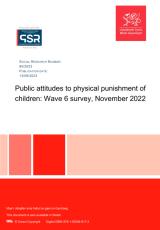This report builds on findings from previous surveys on attitudes towards physical punishment of children, and the Children (Abolition of Defence of Reasonable Punishment) (Wales) Act 2020.
This is not the latest release in the series: Public attitudes to physical punishment of children
Series information:
Main findings
Attitudes towards smacking
- In the latest wave of the survey, 27% agreed and 58% disagreed with the statement that ‘it is sometimes necessary to smack a child’. This difference is narrower than existed at the March 2022 survey (23% agreed, 62% disagreed).
- Opinion remains related to age with those aged over 55 being much more likely to agree that ‘it is sometimes necessary to smack a child’*.
- 25% of those in social grades ABC1 (largely managerial and professional occupations). and 27% of those in social grades C2DE (largely manual occupations), agreed with the statement ‘it is sometimes necessary to smack a child’ .t. This is similar to findings from previous surveys.
- More men agreed with the statement ‘it is sometimes necessary to smack a child’ at 31% compared with 23% of women in the latest survey. Both genders were more likely to agree with the statement when compared with March 2022 results (27% of men and 19% of women)*.
Knowledge of current legislation
- 90% of respondents surveyed in November 2022 correctly thought that the law did not allow parents to smack their children. Only 6% thought the law did allow parents to smack and the remaining 4% reported being unsure.
Awareness of changes to legislation
- In the latest wave of the survey, nearly three-quarters (73%) of people surveyed reported that they were aware of changes to the law in the last year at an unprompted level*. This compares to around two-thirds (66%) who were aware in March 2022. This continues a trend of increasing awareness of a change in legislation since November 2020 when just over a quarter were aware (27%)*.
- At an unprompted level, carers of children under seven were more likely (76%) to be aware of the change than those without these responsibilities (72%).
- At an ‘unprompted’ level, those aged between 16-34 were less likely (52%) to be aware of the change in legislation than those aged 35-54 (81%) and those aged 55+ (82%).
- When prompted with a description of the legislative change more respondents reported that they were aware of the legislation than had done so on an ‘unprompted’ level. A total of 85% knew something about the change, representing an increase in ‘prompted’ awareness compared with the March 2022 survey, when 78% knew something about the change*.
- When prompted, carers of children under seven were more likely (91%) to be aware of the change than those without these responsibilities (84%). This is an increase in awareness of 6% points for carers and 9% points for non-carers since March 2022.
- When prompted with a description of the legislative change, those aged 16-34 were more aware (74%) than when they were unprompted, but they were still less likely to be aware compared with those aged between 35-54 (92%) and those aged 55+ (88%).
- In all surveys, TV news / programme was the most frequently cited as the source of awareness of the change in law.
Opinion of changes to legislation
- In the latest survey almost 56% were in favour of the removal of the defence of reasonable punishment. This is slightly lower than in March 2022 (59%).
- Whilst opinion has remained relatively unchanged since March 2022, the period prior to this has seen an increase in support for the change from 38% in 2020 to 58% in March 2022.
- The change in support for the legislation over time is mostly because of a decrease in the proportions ‘wanting more information / were unsure of their opinion’ not due to an equivalent decline in opposition to the change.
- Women were much more likely to be in favour of the change (66%) than against it (14%). Whilst more men were in favour of the change than against it, the gap between the two proportions was narrower (45% in favour, 31% against). This represents a decrease since March 2022 in the proportion of men in favour (52%) of change and an increase against change (27%).
- When asked why respondents were in favour of the change, the most common response was that they ‘[did] not agree with smacking or physical punishment of children’ (54% of those who were for the change). This was also the most frequent response in the 2018, 2019, 2020, 2021 and March 2022 surveys (40%, 38%, 38%, 42% and 54% respectively).
Reports

Public attitudes to physical punishment of children: wave 6 survey, November 2022 , file type: PDF, file size: 1 MB
PDF
1 MB
If you need a more accessible version of this document please email digital@gov.wales. Please tell us the format you need. If you use assistive technology please tell us what this is.
Data
Datasets and interactive tools
Public attitudes to physical punishment of children: wave 6 survey, November 2022 , file type: XLSX, file size: 85 KB
XLSX
85 KB
If you need a more accessible version of this document please email digital@gov.wales. Please tell us the format you need. If you use assistive technology please tell us what this is.
Contact
Rhys Fletcher
Rydym yn croesawu gohebiaeth yn Gymraeg / We welcome correspondence in Welsh.

